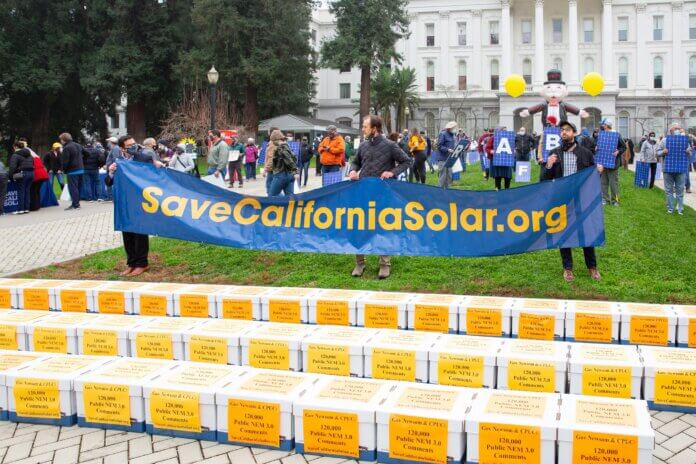Hundreds of solar supporters, including consumers, affordable housing advocates, faith leaders, environmentalists, conservationists and climate activists, joined together for a rally at the California State Capitol building to deliver more than 120,000 public comments to the California Public Utilities Commission (CPUC) and Gov. Gavin Newsom, calling on them to save rooftop solar and stop investor-owned utility proposals to make solar unaffordable in the state.
“This is where the rubber hits the road on blackouts, rising electricity bills and air pollution,” says Dave Rosenfeld, Solar Rights Alliance’s director. “The correct path is to help millions more working- and middle-class people get solar so we can keep up our progress and reject the utility profit grab that threatens to take us backwards.”
The groundswell of public support for solar comes ahead of an expected proposed decision in the coming days by the CPUC on the future of “net metering.” Net metering is the state policy that makes rooftop solar more affordable for consumers of all types by compensating them for the excess energy they produce and share with their neighbors and protecting them from discriminatory fees. Rooftop solar is growing fastest in working- and middle-class neighborhoods because of successful policies like net energy metering.
“The best way to ensure a cleaner and more affordable energy future for our communities is by generating our energy from solar panels on our homes, churches, small businesses, and schools,” comments Pastor Ambrose Carroll, executive director of Green the Church. “We have a moral responsibility to future generations to expand rooftop solar access by preserving net metering for working families, not adding fees that only profit the big utilities.”
Proposals submitted by PG&E, other big utilities the utilities and solar opponents would drastically reduce the credit solar consumers receive and add expensive monthly solar penalty fees to their energy bills.
“This is really a debate between energy democracy vs. energy monopoly. The big utilities want to protect their control over energy delivery to protect their billions in profit,” states Esperanza Vielma, executive director for Environmental Justice Coalition for Water. “The environmental justice community wants energy equity where people are free to generate and distribute energy their own energy in ways that are cleaner and more affordable.”
If utilities get their way, solar will become unaffordable for most consumers, costing thousands of solar jobs, making California more vulnerable to fires and blackouts, and derailing California’s clean energy progress needed to fight climate change. By making the transition to clean energy slower and more expensive, it would cost the state tens of billions over time and each ratepayer $295 a year, the Save California Solar coalition explains.
“California risks losing more than 50,000 jobs and 1,500 small businesses if the state turns the lights out on rooftop solar,” adds Bernadette Del Chiaro, executive director of the California Solar & Storage Association. “Governor Newsom and the CPUC should not reward big utilities like PG&E while at the same time killing jobs, hurting regular consumers and derailing California’s climate change efforts. We need to keep California a solar state.”
To date, more than 600 diverse organizations endorsed protecting net metering and championing rooftop solar, making the Save California Solar coalition one of the largest in the state’s history tied to clean energy.
“Rooftop solar needs to continue to grow quickly for California to reach its clean energy goals,” mentions Laura Deehan, state director at Environment California Research & Policy Center. “Governor Newsom has the golden opportunity to help California reach its climate goals, keep the lights on and protect our state’s precious open spaces. Over 120,000 Californians agree: Governor Newsom needs to stand up to the state’s investor-owned utilities and keep rooftop solar within reach for California families and businesses.”
The state needs net energy metering and strong energy policies that enable individual and community energy resource ownership. Limiting it will impair the opportunities available to community members to share in the wealth and be an active part of the transition to a regenerative energy economy, observes People Power Solar Cooperative’s co-founder and CEO, Crystal Huang.
“The governor and the CPUC list three legs to ensuring reliability in our energy supply: rooftop solar, investor-owned utility infrastructure and energy efficiency,” explains Berkeley City Councilmember Kate Harrison. “Destroying incentives for rooftop solar will topple this three-legged stool and threaten our energy future.”




